Why Pigeons Don’t Fly at Night?
Pigeons are quite adaptable animals compared to their peers and have survived seemingly effortlessly as humans took over the world. They are able to fly hundreds of miles on any given day, and will be able to find their way back from up to 1100 miles away from their nesting spots.
However, despite all these immensely useful traits, we still wonder why pigeons don’t fly at night.
They have not been able to develop the ability to fly at night or in the dark due to their homing instincts being dependent on factors that are only present or more favourable during the day.
They also do not have the adapted features that other nocturnal animals have favoured, to enhance their abilities to see and hunt in the dark.
So read along with this article to find your answer to and how they compare to other birds with similar abilities.
Looking for more articles about pigeon habit:
What Causes Pigeons to Not Fly at Night?
So, the way pigeons are able to find their way back home so effectively is due to their ability to use the Sun, a magnetic compass, and their sense of smell.
Out of these three, the Sun is obviously only out during the day, and their reluctance to fly without it to guide them shows exactly how dependent they are on it.
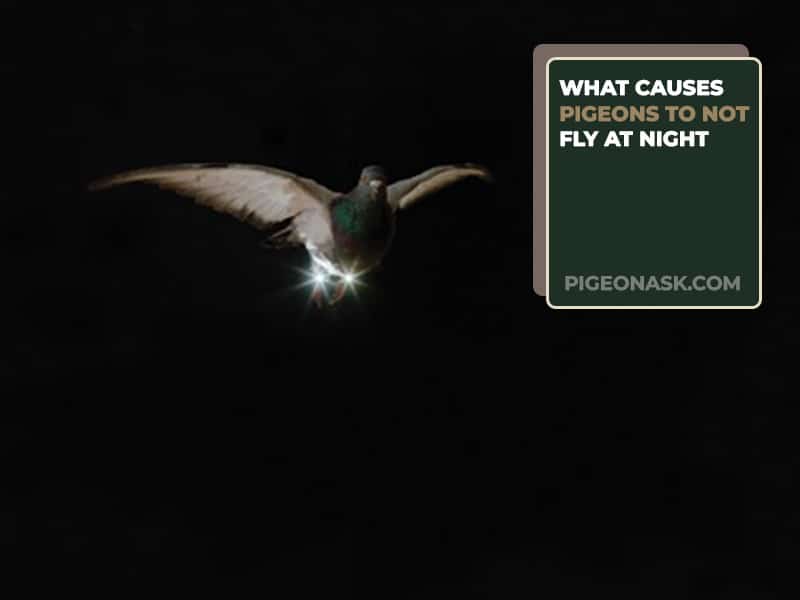
Flying at night is probably not the safest idea for these birds, as their predators, such as cats or hawks, are likely to have better sight in the dark.
It is simply too dangerous for them to be out when they are not able to use their navigation abilities or even see well enough to protect themselves.
We have covered an in-depth article on “Pigeon Habits“; if interested, you can check this article here.
What Would Happen If Pigeons Did Fly at Night?
It is quite dangerous for pigeons to be flying about at night. With their poor eyesight without proper lighting, they could easily be hit by other objects in the way, such as trees, buildings, or even other birds.
Their hunters are more active during the night and have the advantage in the dark.
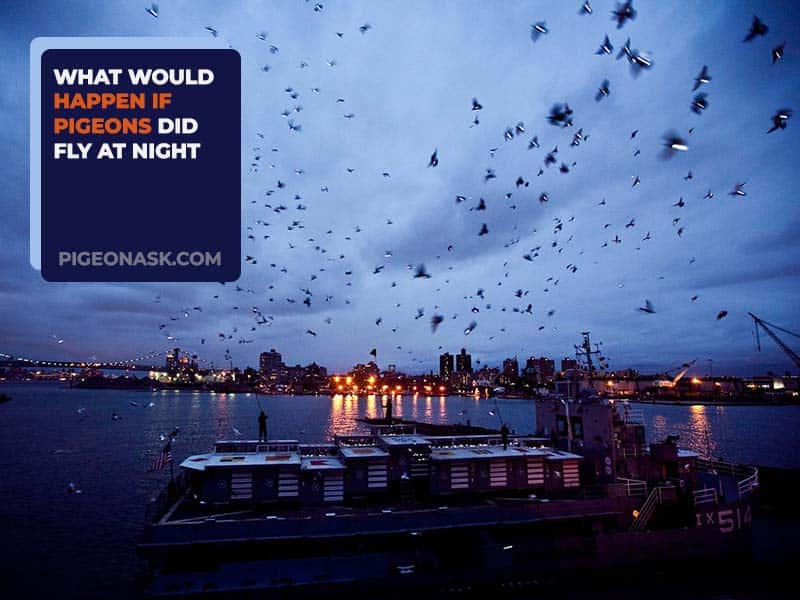
This is why pigeons prefer to sleep during that time in high, secluded places and pass the time in there until it is light enough for them to come out.
With their poor navigation skills in the dark, if forced to fly at night during colder days, they will have to face the danger of freezing to death as well.
It will be even more likely to find them dead if their immune system has been compromised recently due to some illness or if it is soon after mating, as they are more vulnerable during that time.
What Types of Pigeons Fly at Night?
So far, there have been no exceptions found in the different species of pigeons that give any clue as to whether or not they are active during the night.
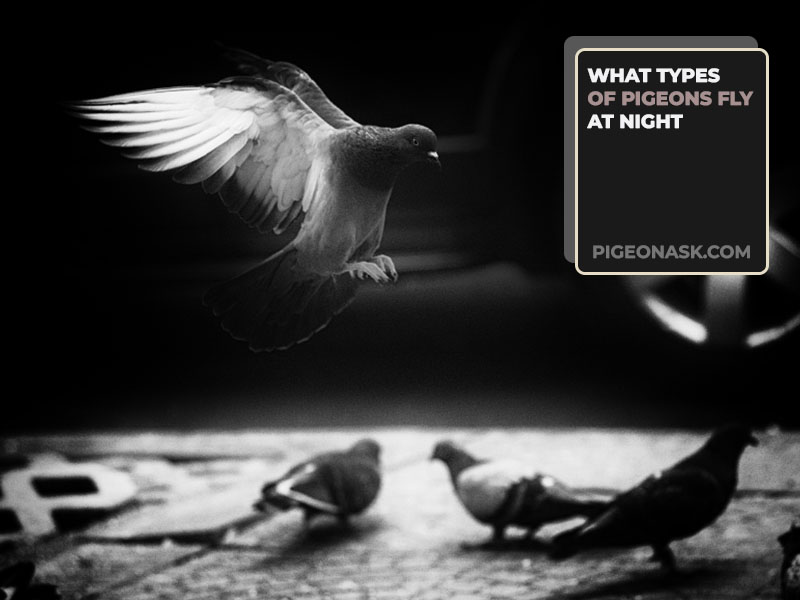
They just have not developed the ability to hunt and survive without light, even though they actually prefer dark places to sleep during the time.
Despite this information, we will still take a closer look at Homing and Carrier pigeons to see if they are able to fly at night and why.
Homing Pigeons − Do Homing Pigeons Fly at Night?
Homing pigeons, as intelligent as they are, will choose not to fly at night, no matter how important a task they may be assigned.
These pigeons have been through selective breeding to have honed their ability to fly back home safely from long distances.
However, since those navigation skills are partially dependent on the sun and light, it is better to refrain from forcing them out.
On top of that, their eyesight do not work at full capacity in the dark which puts them in mortal danger. Since they are at a disadvantage compared to their predators at night, training to make them fly at the time would likely end with death more times than not.
Carrier Pigeons: Can Carrier Pigeons Fly at Night?
Carrier pigeons and homing pigeons are often mixed up as the name “Carrier” gives you a picture of the pigeon being mainly used for carrying objects or messages (picture Hedwig from Harry Potter carrying his owner’s birthday gifts home, except it is a pigeon instead of an owl).
Though carrier pigeons have also been selectively bred from the same species of rock pigeons, their selected trait was their beauty rather than strength.
It is even less plausible for carrier pigeons to have the ability to fly at night as they barely have the exceptional ability to navigate as their relatives, the homing pigeons, do.
Do Racing Pigeons Fly at Night?
Racing pigeons have been bred selectively for a very long time ago, carefully honing their traits of accurate navigation and speed of reaching home the fastest.
However, even this makes them no exception to the collective rule of avoiding flight at night.
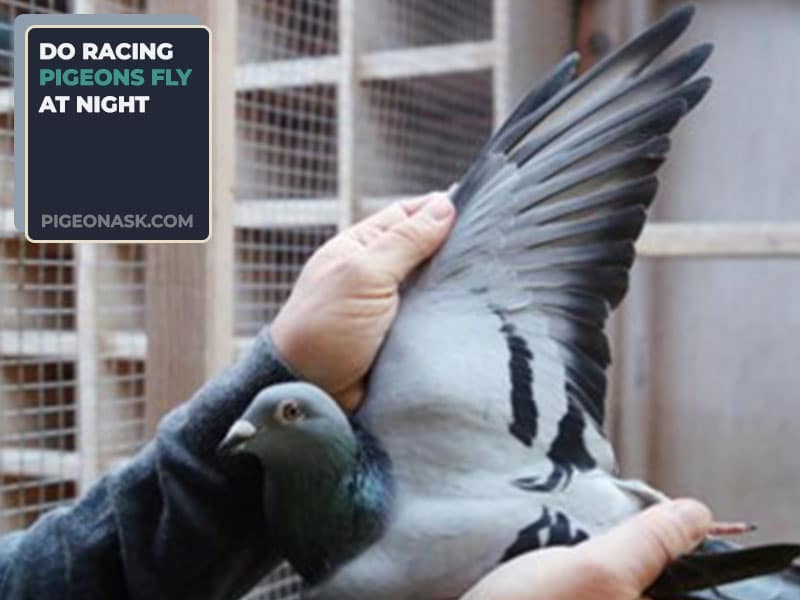
Eyesight for all pigeons is poor at night, so even with their ability to find their way home the fastest, putting them in that kind of danger would be bordering on unethical. Without their ability to see in the dark, they will not be able to defend themselves against their predators.
Maybe they will be safe from raccoons and opossums if they do not land themselves on the ground, but they will still have to fly faster than falcons, hawks, and owls, who can definitely see much better than pigeons at night.
Do Pigeons Fly Around at Night?
Pigeons do not fly around at night, even though they have small distances to spread their wings a little. Instead, they choose to seclude themselves in dark, difficult-to-reach spots.
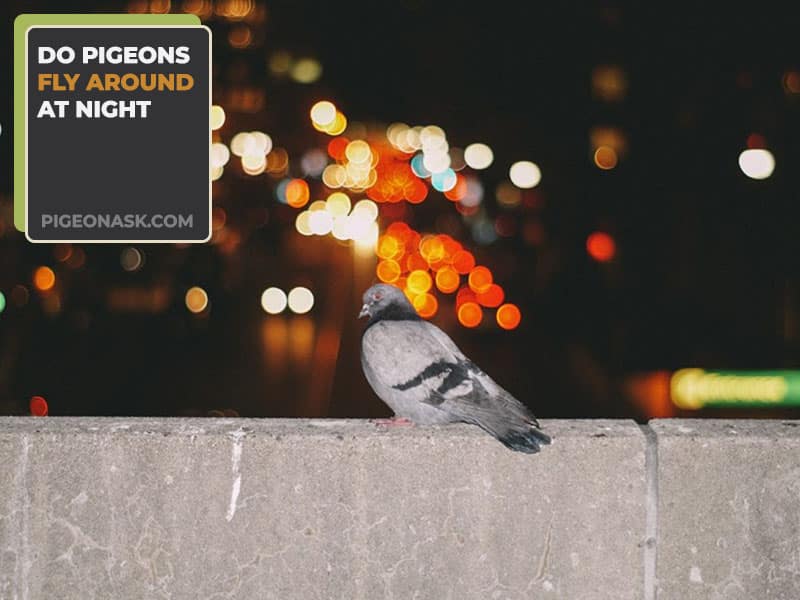
The only way they will move from this safe spot is due to some loud noise or disturbances that trigger their survival instincts.
This means that they will only fly at night if they are in danger, or at least in more danger than they will be flying in the dark with their predators on the hunt.
What Time of Day Do Pigeons Typically Fly?
According to Pest Pointers, “Even though pigeons are active all day long, they are most active in the morning. This is the time when they leave their roost and start looking for spilled food from the night before.”
Pigeons do all their activities during the day and have to fly back and forth to their nests if they are raising squabs to feed them the food that they hunted.
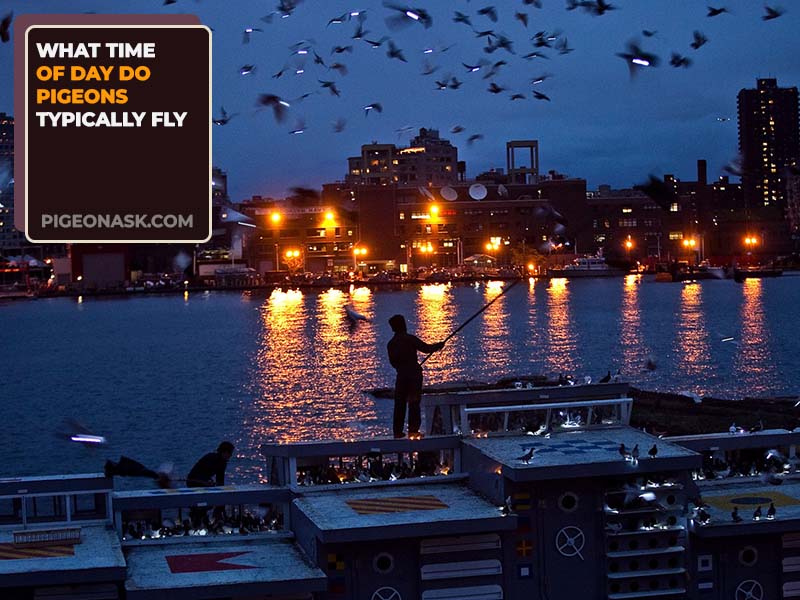
However, as Pest Pointers mentioned, they are most active in the morning as if to make up for feeding and hunting time that they lost the night before.
As the day passes, their activities will slow down as it begins to get darker, as their poor eyesight during the night prevents them from scouring for food as effectively as in the morning.
How Do Other Birds Manage to Fly at Night?
There are many nocturnal animals, a lot of them actually hunting for pigeons, who actually prefer to be out at night than during the day.
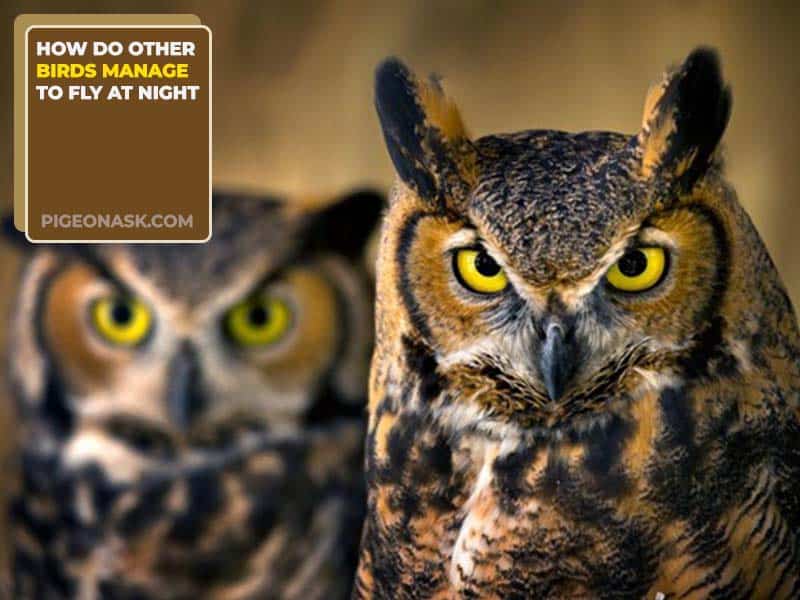
Birds like owls, woodcocks, night herons, and frogmouths have adapted features through natural selection (more commonly known as the survival of the fittest phenomenon through generations) gives them the genetic ability to hunt better at night.
Let us take a look at which enhanced features they use to adapt to the dark.
01. Large Eyes and 270 Degree View:
Owls have large eyes and the impressive ability to turn their heads a full 270 degrees in any direction, which allows them to see in the dark almost all around them. They can spot their enemies long before their enemies has had the chance to even smell them.
02. Enhanced Sense of Smell and Hearing:
Nocturnal birds will also have a more enhanced sense of smell and hearing to keep them on high alert. They are highly sensitive to smell and unnatural sounds in nature, which lets them tune into specific areas to hunt out their predators before they themselves become the hunted.
03. Camouflage:
A lot of nocturnal birds have more muted colours on their feathers that help camouflage them in the dark and into their surroundings at night. A lot of owls have feathers with colours that perfectly match tree barks and branches, and can hide themselves simply by closing their eyes and staying still.
04. Pigeons Do Not Have These Enhanced Abilities:
These abilities show that they are extremely capable of protecting themselves in the dark, in fact probably better than during the day when their eyes may become too sensitive to the bright light.
They have the confidence to hunt and travel in absolute darkness simply because they have to capability to do it. Sadly, pigeons do not have that capability and are more attuned to the human timetable than most wild animals.
Conclusion
So now you understand that pigeons are no nocturnal enthusiasts and will only take flight at night if they are forced to do so. There has been no exception to this rule yet, at least not one that scientists have yet discovered. With that, we can conclude this article on Why Pigeons Don’t Fly at Night.
If you enjoyed this article, make sure to share it on your social media. You can connect with us on Facebook, Twitter, and Pinterest to find more interesting articles on pigeons and similar topics, so do not forget to follow us!
Image Credit:
- Cabinetmagazine.org (Jasper van den Brink)
- Photo from canva.com/photos
- Voanews.com (Photo from Reuters)
- Photo from Urban Evolution
- Photo by Byron Smith from the New York Times
- Photo by Brian Peterson from Star Tribune
Article References:
- https://www.cabinetmagazine.org/issues/21/vandenbrink.php
- https://www.britannica.com/sports/pigeon-racing
